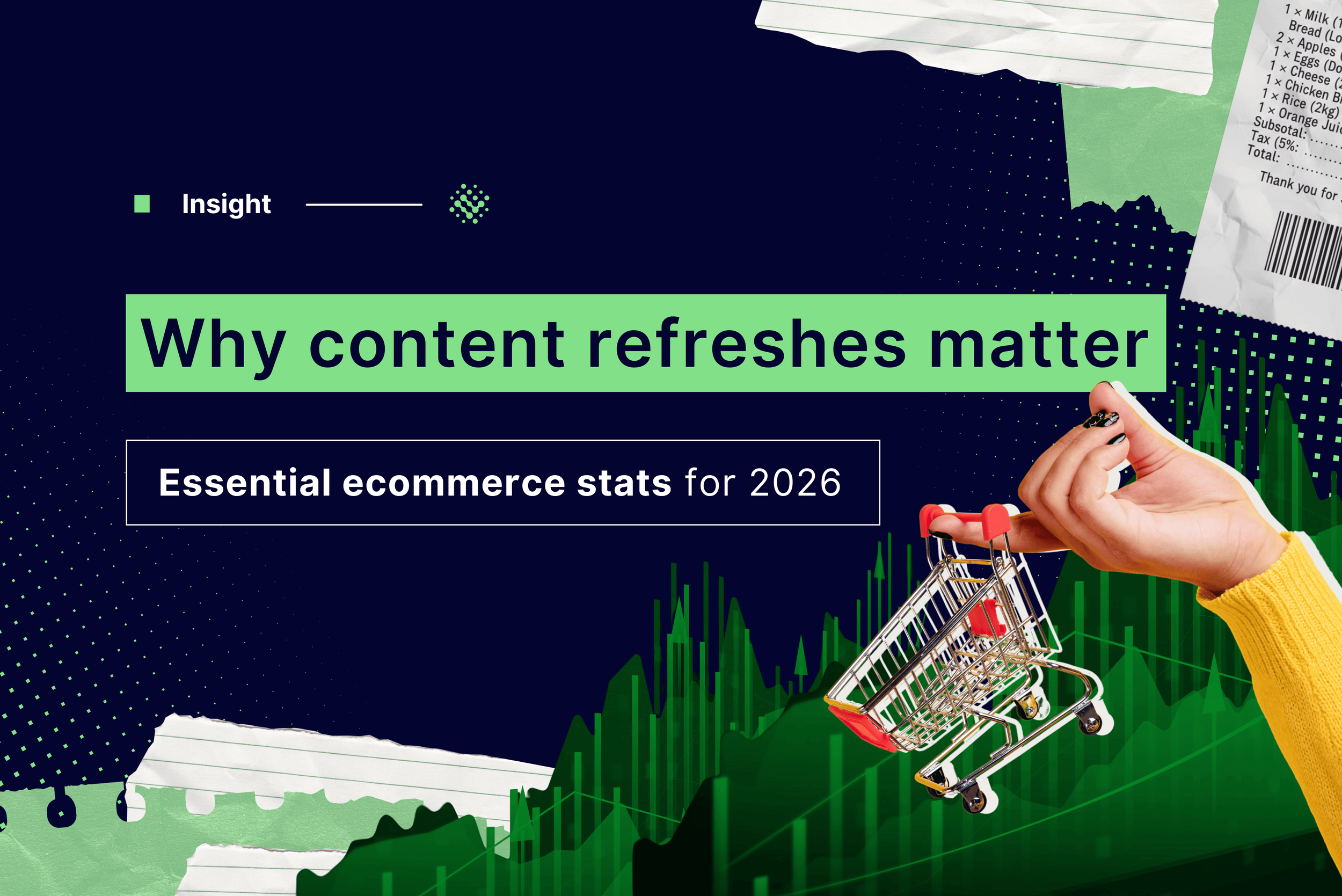Agentic AI: Ecommerce’s New Frontier
What is agentic AI, how does it differ from traditional automation tools… and what does it mean for Ecommerce in 2025?
These days, it feels like artificial intelligence is making a new breakthrough every week. Among the latest trends making waves is agentic AI – a transformative approach that promises to redefine how intelligent systems operate, interact, and ultimately drive business growth. But what is agentic AI? And how does agentic AI distinguish itself from other AI paradigms? What about its benefits, the challenges it poses, and what it could mean for the future of Ecommerce? In this insight piece, I hope to cut through the hype and clear up some key questions, empowering you to understand how agentic AI systems could be customized for your specific business needs.
What is Agentic AI?
Agentic AI systems are often also referred to as AI agents. The term “agentic” refers to artificial intelligence systems designed with agency (as is probably no surprise). But what does “agency” mean in practice?
Bona fide AI agents can operate independently to make decisions, learn from their environment, and act to achieve designated goals. Unlike traditional AI systems that might rely on pre-programmed rules or require direct human intervention at every step, agentic AI possesses a level of autonomy. These agents are not only reactive but also proactive – able to anticipate needs, explore new strategies, and adapt dynamically to changing conditions.
In essence, agentic AI functions similarly to human employees in that it:
Observes: Continuously gathers data from its environment.
Decides: Evaluates the data against its objectives.
Acts: Executes decisions to further its goals, sometimes even discovering new goals along the way.
This represents a monumental opportunity – not only for Ecommerce, but for the business world on a global scale. AI agents – able to adapt to unexpected disruptions and learn from their mistakes – have the potential to take on vast amounts of manual, repetitive desk-work that would usually take a human employee weeks or even months. That carves out more time for your team to focus on creative or strategic projects, with better job fulfilment, productivity, and satisfaction to boot.
How does Agentic AI differ from traditional automation tools?
While the term "agent" might evoke images of traditional automation bots, agentic AI stands apart in several critical ways.
AI agents prioritize autonomy over automation.
Traditional automated systems follow a fixed set of instructions. In contrast, agentic AI can decide which actions to take without explicit instructions for every scenario. This autonomy allows it to handle novel situations effectively.AI agents are goal-oriented.
Rather than executing tasks in a linear, predetermined manner, agentic AI systems are designed with overarching goals. They continuously evaluate their environment and adjust their strategies to maximize goal attainment, much like an entrepreneur navigating market challenges.Agentic AI prioritizes learning and adaptation.
While many AI systems are capable of machine learning, agentic AI goes a step further by integrating continuous learning with decision-making. It can refine its actions based on real-time feedback, making it more resilient and effective in dynamic settings.AI agents are interactive.
Unlike static systems that passively respond to inputs, agentic AI interacts with its environment, which includes other systems, users, and external data sources. This interactivity makes it a potent tool for managing complex ecosystems like Ecommerce platforms.
Benefits of AI Agents for Ecommerce
There are several key advantages of agentic AI for Ecommerce.
Enhanced Personalization
Agentic AI systems can analyze customer behaviors in real time and adjust recommendations, promotions, and content dynamically. This hyper-personalized experience increases customer satisfaction and drives conversion rates.Operational Efficiency
By autonomously managing inventory, pricing strategies, and supply chain logistics, agentic AI can optimize operations, reduce costs, and minimize human error. This efficiency translates to faster delivery times and a better overall customer experience.Dynamic Market Adaptation
In the volatile landscape of Ecommerce, market trends shift rapidly. Agentic AI's ability to learn and adapt on the fly means businesses can stay ahead of trends, swiftly adjusting strategies to capture emerging opportunities.Improved Decision Making
Agentic AI systems leverage vast amounts of data to inform decisions. Their capacity for independent analysis and action means they can propose or implement changes more rapidly than traditional decision-making frameworks, fostering a more agile business environment.
Challenges, risks, and ethical considerations of AI Agents in Ecommerce
With great power comes great responsibility. While the potential of agentic AI is vast, it is crucial to address the inherent challenges and ethical implications that comes with this technology.
Accountability
When an AI system acts autonomously, attributing responsibility for its actions can be complex. Businesses must establish robust frameworks to monitor and audit the decisions made by agentic AI systems to ensure accountability.Bias and Fairness
Like all AI systems, agentic AI is susceptible to biases embedded in the data it learns from. Rigorous testing and transparent methodologies are essential to prevent discriminatory practices, particularly in customer-facing applications.Security Risks
Autonomous systems, if not properly secured, could be exploited by malicious actors. Ensuring that agentic AI systems have strong safeguards against hacking and data breaches is paramount.Ethical Use
The ability for AI to make decisions independently raises ethical questions about transparency, consent, and the potential for unintended consequences. Establishing ethical guidelines and regulatory frameworks will be key in navigating these concerns.
The future of Agentic AI for Ecommerce
As agentic AI continues to evolve, its impact on copywriting and SEO within Ecommerce is set to be revolutionary. The next generation of digital marketing will be defined by AI-powered content strategies that not only engage customers but also drive higher search engine rankings.
Tailored Content Creation
Agentic AI will soon enable Ecommerce platforms to generate personalized copy that speaks directly to individual customer segments. By analyzing consumer behavior and preferences in real time, these intelligent agents can craft unique product descriptions, blog posts, and ad copy that resonate with target audiences—boosting both engagement and conversion rates.Dynamic SEO Optimization
Traditional SEO strategies are often reactive and static. In contrast, agentic AI can continuously monitor search trends, keyword performance, and competitor tactics to adapt content strategies on the fly. This means that your eCommerce site can stay ahead of the curve with real-time adjustments, ensuring top rankings on search engine results pages (SERPs) and attracting consistent organic traffic.Enhanced Keyword Strategy
With the ability to process vast amounts of data, agentic AI can uncover emerging keywords and semantic search trends that traditional research might overlook. By integrating these insights into your content strategy, your eCommerce platform can target long-tail keywords and niche queries, providing a competitive edge in crowded markets.Automated A/B Testing and Content Refinement
Agentic AI can autonomously run A/B tests on various copy elements—from headlines to call-to-action buttons—determining which variations perform best. This continuous optimization process not only improves user engagement but also refines SEO strategies by ensuring that all content is aligned with the latest search engine algorithms.Real-Time Content Adaptation
Imagine an AI that can instantly tweak your product descriptions or landing page content based on shifts in user behavior or seasonal trends. This real-time adaptation ensures that your messaging remains relevant and persuasive, ultimately leading to better search visibility and higher conversion rates.Integrated Analytics for Strategic Insights
By merging copywriting and SEO data with customer behavior analytics, agentic AI provides a holistic view of your content’s performance. This integration empowers marketers to make data-driven decisions, fine-tune campaigns, and forecast future trends—all of which are critical for maintaining a competitive advantage in the fast-paced world of eCommerce.
In summary, the future of agentic AI in eCommerce is poised to redefine copywriting and SEO. By delivering tailored, dynamic, and continuously optimized content, agentic AI will empower businesses to capture new markets, enhance user engagement, and drive sustainable growth in the digital marketplace. Embracing these advancements will not only elevate your brand’s online presence but also ensure that your Ecommerce platform remains agile and competitive as technology pushes onwards.
So, are AI Agents the future of Ecommerce?
In my opinion, absolutely. Agentic AI is a definite leap forward in the way intelligent systems are designed and deployed. AI agents’ ability to operate autonomously, learn continuously, and adapt in real time make them a powerful tool for addressing the complexities of modern Ecommerce. However, with its benefits come significant challenges and ethical considerations that must be managed with care.
By staying informed and proactively addressing the challenges, Ecommerce businesses can harness the potential of agentic AI to not only meet but exceed customer expectations online.












